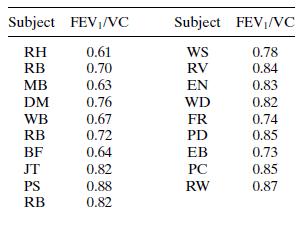The production of a nationally marketed detergent results in certain workers receiving prolonged exposures to a Bacillus
Question:
The production of a nationally marketed detergent results in certain workers receiving prolonged exposures to a Bacillus subtilis enzyme. Nineteen workers were tested to determine the effects of those exposures, if any, on various respiratory functions. One such function, air-flow rate, is measured by computing the ratio of a person's forced expiratory volume (FEV1) to his or her vital capacity (VC). (Vital capacity is the maximum volume of air a person can exhale after taking as deep a breath as possible; FEV1 is the maximum volume of air a person can exhale in one second.) In persons with no lung dysfunction, the "norm" for FEV1/VC ratios is 0.80. Based on the following data (164), is it believable that exposure to the Bacillus subtilis enzyme has no effect on the FEV1/VC ratio? Answer the question by constructing a 95% confidence interval. Assume that FEV1/VC ratios are normally distributed with σ = 0.09.
Step by Step Answer:

Introduction To Mathematical Statistics And Its Applications
ISBN: 9780321693945
5th Edition
Authors: Richard J. Larsen, Morris L. Marx





